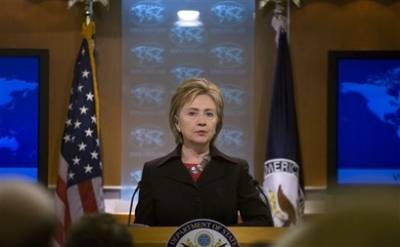US Secretary of State Hillary Clinton urged China on Thursday to investigate cyberattacks on Google and other US companies and called on US technology firms not to support Internet censorship.
Clinton, without specifically mentioning China, also said in a speech at the Newseum here that countries and individuals who engage in cyberattacks should be punished.
China, meanwhile, sought to play down the row with the United States over Internet freedom, insisting Thursday that Google's threat to quit the country over censorship and cyberattacks should not be linked to Sino-US ties.
In another development, Microsoft on Thursday released a patch for an Internet Explorer 6 software hole through which China-based cyber spies allegedly probed the computer systems of Google and other companies.

Clinton cited China, North Korea, Tunisia and Uzbekistan as countries restricting the "free flow of information" or censoring the Internet and said access to social networking sites in Vietnam has "suddenly disappeared.".
She said 30 bloggers and activists had been detained in Egypt and pointed to China, Saudi Arabia and Vietnam as nations which have "co-opted the Internet as a tool to target and silence people of faith."
"On their own, new technologies do not take sides in the struggle for freedom and progress," she said. "But the United States does. We stand for a single Internet where all of humanity has equal access to knowledge and ideas."
But, she said, "some countries have erected electronic barriers that prevent their people from accessing portions of the world's networks.
"They have expunged words, names and phrases from search engine results," she said. "They have violated the privacy of citizens who engage in non-violent political speech."
Clinton said the United States was supporting the development of new tools which will "enable citizens to exercise their right of free expression" by circumventing censorship and called on US technology firms to play a role.
"I hope that refusal to support politically motivated censorship will become a trademark characteristic of American technology companies," she said. "It should be part of our national brand."
"The private sector has a shared responsibility to help safeguard free expression," Clinton said. "And when their business dealings threaten to undermine this freedom, they need to consider what's right, not simply the prospect of quick profits."
She said the State Department would hold a high-level meeting next month with companies that provide network services for talks on Internet freedom.
Google, Microsoft, Yahoo! and Cisco are among the US technology giants that have been accused by members of the US Congress and others of helping to build what has been dubbed the "Great Firewall of China."
Google, however, following a wave of cyberattacks on Chinese human rights activists that originated in China, said last week it would no longer censor its Chinese search engine even if it means the Internet giant has to shut down its business operations there.
Clinton called on China "to conduct a thorough investigation of the cyber intrusions" revealed by Google and for "its results to be transparent."
"The Internet has already been a source of tremendous progress in China, and it's great that so many people there are now online," she said.
"But countries that restrict free access to information or violate the basic rights of Internet users risk walling themselves off from the progress of the next century."
Clinton said cyberattackers should face punishment. "Those who disrupt the free flow of information in our society, or any other, pose a threat to our economy, our government and our civil society," she said.
"Countries or individuals that engage in cyberattacks should face consequences and international condemnation," she said. "In an interconnected world, an attack on one nation's networks can be an attack on all."
Clinton's remarks came after China said Google's threat to quit the country over censorship and cyberattacks should not be linked to Sino-US ties.
"If Google has any problems in its business in China, these must be resolved according to Chinese law, and the Chinese government is willing to help resolve these problems," Chinese Vice Foreign Minister He Yafei said.
"The Google case should not be linked with relations between the two governments and countries; otherwise, it's an over-interpretation," state media quoted him as saying.
China has defended its right to filter information available on the Web and repeatedly told foreign firms they must obey its laws.
























